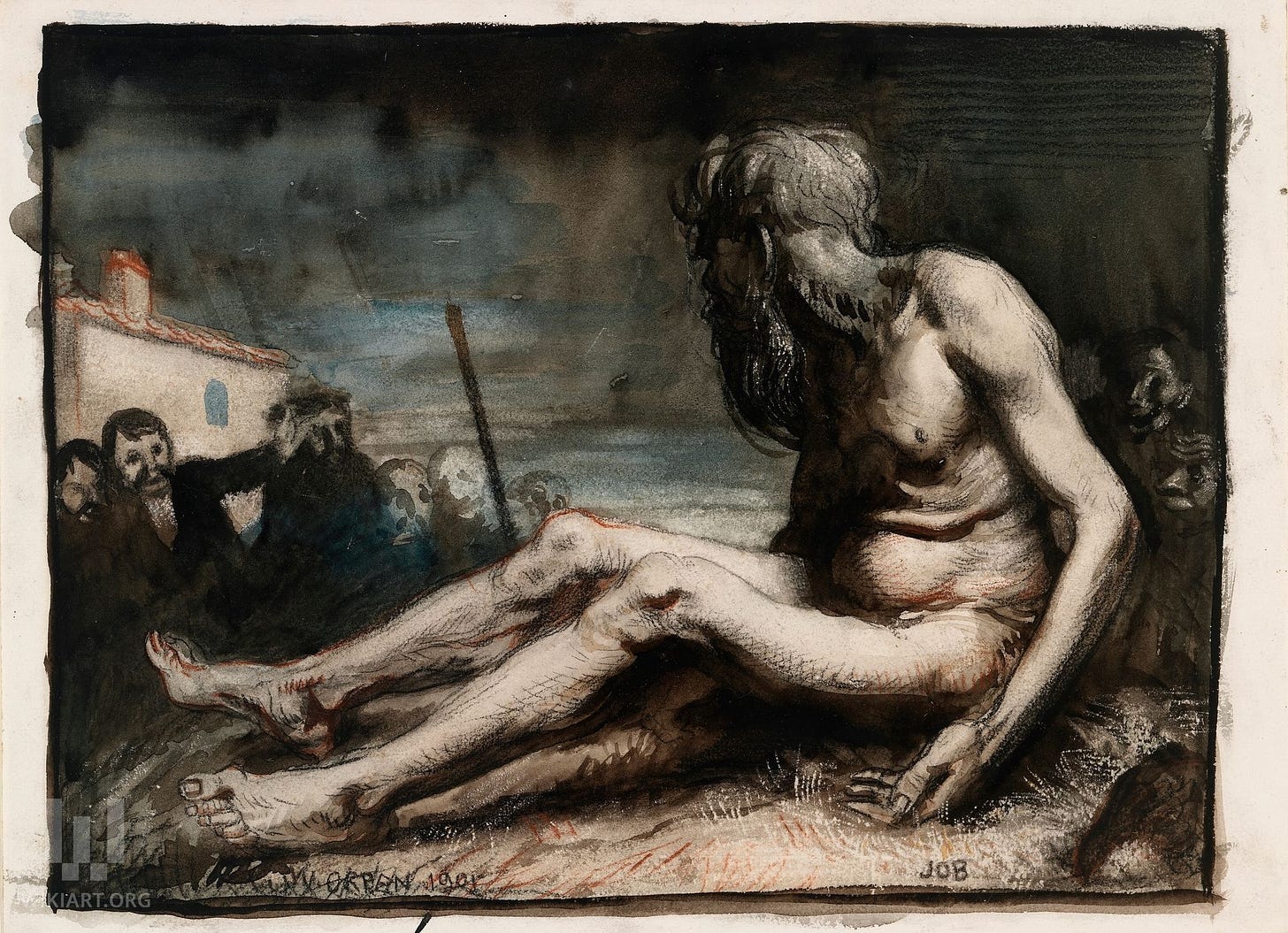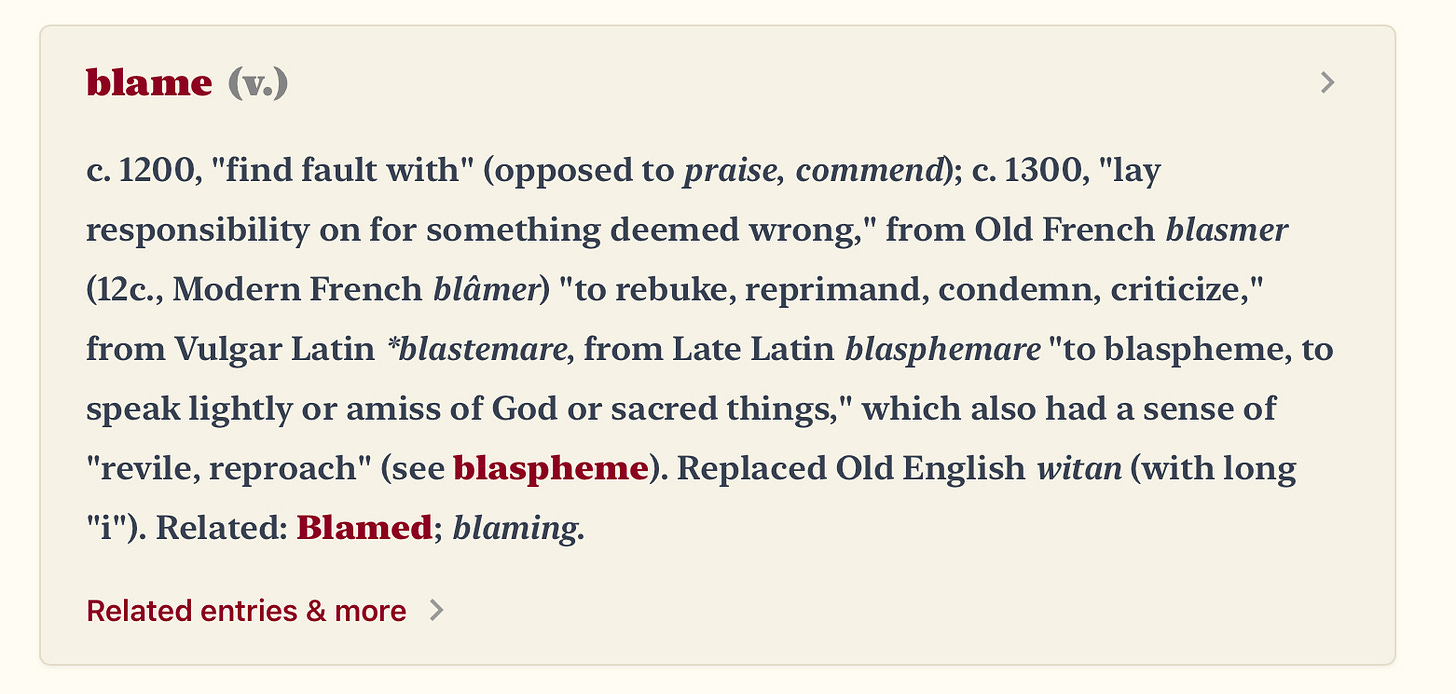Dark as Midnight, Part 2
part two of a three part Brian Zahnd sermon series on the Book of Job
This is the first of two sermon reflections for Sunday, October 19, 2025. In this essay I share my reflections about Brian Zahnd’s sermon on the middle part of the Book of Job.
image: George Kalaydzhiev via Unsplash
“Elihu isn’t intelligent, he would have been a great internet influencer because he doesn’t know he’s not smart.” —Brian Zahnd
“The Elihu speeches could not have been part of the original book both because Elihu is never mentioned in the frame-story, either at the beginning or at the end, and because the bombastic, repetitious, and highly stereotypical poetry he speaks is vastly inferior to anything written by the Job poet.”— Robert Alter, The Hebrew Bible: A Translation with Commentary
The book of Job has three elements — the frame story, the poetic exchange between Job and his three friends (Eliphaz, Bildad, Zophar), and the Elihu speech. Though part of the biblical canon, the six Elihu chapters didn’t form a part of the original Book of Job. The original Job poet didn’t write the Elihu chapters, a later and lesser poet wrote them. So, the Elihu chapters teach us that it’s difficult to resins blaming others who suffer a crisis. Elihu thinks the three friends didn’t blame Job enough, he misses an important point.
To recap from last week, the story of Job describes the experience of a man named Job, a pious and blameless man who had a good and wealthy life and who fell on hard times. G-d allowed The Accuser, called Ha Satan in Hebrew, to test Job’s faith by inflicting various hardships and trials on him. The book begins with a prosaic prologue which sets up the story. It moves onto the poetic exposition of the story. The book ends with a prosaic epilogue with ties up loose ends, and tells of G-d restoring the things Ha Satan took from Him during the trial.
Part two of Dark as Midnight will cover the Elihu chapters.
Summary and Exegesis
The story of Job. Job, a blameless man, gets caught in a contest between the Divine and the diabolical—a contest of which he knows nothing. Job loses his wealth, his health, and all ten of his children.
Recap. Last week we covered the deal the Accuser made with G-d. We covered the three friends —-Eliphaz, Bildad, Zophar—who come to sit with and offer comfort to Job. After seven days of sitting in silence, Job breaks the silence to curse the day of his birth. After Job’s crying out in his suffering, the three friends take turns blaming Job for his suffering. That’s a recap from last week’s sermon, which covered the first half of the book, up to and including around chapter 27.
Fast forward, looking ahead. Job 42:7 :: “My wrath is kindled against you and against your two friends; for you have not spoken of me what is right, as my servant Job has.” In the last chapter of the book of Job, we will see G-d’s anger at Eliphaz and Bildad and Zophar. He tells the three friends that their theology of blame misrepresents Him. We’ll get to that next Sunday.
32:1-5 :: these three men ceased to answer Job, because he was righteous in his own eyes. 2 Then Elihu son of Barachel the Buzite, of the family of Ram, became angry. He was angry at Job because he justified himself rather than God; 3 he was angry also at Job’s three friends because they had found no answer, though they had declared Job to be in the wrong.[a] 4 Now Elihu had waited to speak to Job, because they were older than he. 5 But when Elihu saw that there was no answer in the mouths of these three men, he became angry.
Eilhu, a man younger than Job and his friends, decides that Job’s friends failed to rebuke him sufficiently. The way Elihu sees it, G-d has all under control. G-d embodies justice. Anything He does becomes just—all hardship comes from Him to punish those whom He thinks deserve it. Therefore Elihu concludes that the suffering of Job happened because he sinned. Elihu thinks Job had it coming.
34:7-9 :: 7 Who is there like Job, who drinks up scoffing like water, 8 who goes in company with evildoers and walks with the wicked? 9 For he has said, ‘It profits one nothing to take delight in God.’
Elihu tells a falsehood here. He makes reference to what Job says in 21:15, taking that quote of out of context. Reader, how many times have we seen online influencers take a thing out of context, in their attempt to rage bait, as part of their larger engagement farming strategy, or to manipulate popular opinion and influence political outcomes? BZ quips that Elihu would have made a great internet influencer.
34:35-37 :: 35 ‘Job speaks without knowledge, his words are without insight.’ 36 Would that Job were tried to the limit, because his answers are those of the wicked. 37 For he adds rebellion to his sin; he claps his hands among us, and multiplies his words against God.”
Reader, that’s some strong vengeful language Elihu uses against Job. Does Elihu want to lynch Job? Does Elihu think Job should die? He clearly views Job’s complaint as rebellion. Steinsaltz interprets Elihu’s words here as follows. “My wish is that Job should be tried until eternity, through all kinds of tests, for answers regarding men of injustice, or because he answers together with the wicked with whom he keeps company.”
36: 1-3 :: Elihu continued speaking: 2 “Let me go on, and I will show you the truth. For I have not finished defending God! 3 I will present profound arguments for the righteousness of my Creator. (NLT)1
Elihu feels the need to defend G-d. Reader, that’s a slippery slope. When have we seen righteous men get on their soapboxes in order to defend G-d from those whom they designate sinner? Ahem, the inquisition. Ahem, heresy trials. Ahem, Hamas. The history of the church and religion in general tells the tragic story of many innocent people burned at the stake or otherwise slaughtered for wrong think or for existing — people murdered by the fanatical righteous men to defend G-d from the unpalatable thoughts of humans in a memetic crisis. Reader, we all have an inner Savonarola we must battle, don’t we? Elihu has got his Savonarola on.
36:22,26 :: 22 “Look, God is all-powerful. Who is a teacher like him? … 26 “Look, God is greater than we can understand.
In a nutshell, Elihu seems to say, “G-d is great we can’t understand Job sucks.”
Reader, do you remember the first thing the Book of Job tells us about Job? “There once was a man named Job who … was blameless—a man of complete integrity. He feared God and stayed away from evil.” (Job 1:1). So, Elihu has essentially projected his fear onto Job. Unable to accept that bad things happen to good people, Elihu continues in the same vein as Eliphaz, Bildad, Zophar — he creates his own theology, misrepresenting G-d and blaming the victim. It’s a common practise humans engage in, reader. We all do it, and we all can think of examples in the public discourse where it happens. I’ve written about Girard’s Mimetic Theory in this publication, in a slightly different context. This biblical story relates to that body of work.
What role does a Christian have, when s/he reads scripture? A Christian must find Christ in the scripture. Where do we find Christ in the book of Job? We find Christ in the person of Job.
artwork: Job on the Dunghill, by William Orpen, 1905
How do we related Jesus to Job?
We remember Jesus as the blameless One.
Let’s review the story of Jesus. He’s arrested and brought to Sanhedrin. He remains silent as many bear false witnesses against, and testify before the Sanhedrin against Him. Through the attacks and accusations, through the litany of false witnesses borne against Him in testimony, Jesus says nothing. Then Caiphus puts Jesus under oath, and says, “I charge you under oath by the living God: Tell us if you are the Messiah, the Son of God.” (Matthew 26:63). Jesus answers honestly and He receives a death sentence. Jesus took all the blame.
Reader, this reminds me of 1 Corinthians 6: 7. “Why not rather be wronged,” Paul asks the Corinthians, “Why not rather be defrauded?” On Friday, I wrote an essay about a Chris EW Green OTC lecture on 1 Corinthians 6.
What does Paul mean by line 7? Thistleton suggests a slightly refined translation, why not let yourselves be wronged? Chris Green calls this middle voice, not active and not passive, middle.1 Why not allow this thing to happen to you? Thistleton calls this a permissive reflective middle voice. It suggests our position as members of the body of Christ, we have freedom, however we don’t have autonomy from G-d, we must yield to His law. Obedience to G-d frees us. Self control, an important fruit of the spirit, provides us with freedom. The Sprit provides us with most freedom. The victory of the martyr provides the greatest victory. Martyrs judge the world.
If you endure the injustice, you are victorious; you are deprived of money but not of the victory won by a disciplined life. Your opponent cannot compel you to do what you do not wish to do. Here is the proof: tell me, who was victorious, the envious one or the one on the dunghill? ... Whose victory do we admire, that of the devil who afflicted Job, or that of Job who was afflicted? Clearly Job, even though he could not hold onto his perishable wealth or save his children. And why do I speak of wealth and children? Job could not even protect his own body. But nonetheless Job, who lost all his possessions, is the victorious one. — Crysostom’s Homily (17) on 1 Corinthians 6.
Job loses everything and yet, he loses nothing. He remains faithful to G-d, and he gains his freedom in that way, he achieves victory.
— from Have Mercy on Yourself in Christ, October 17, 2025.
Jesus goes to Hades, and he raises Adam and Eve up with Him.
image: the Harrowing of Hades, orthodox icon, a primary icon of Pascha
Jesus leaves blame in Hades. He returns from death without blame. He leaves blame with the Satan. Remember, in Hebrew, Satan means accuser! Blame belongs to the accuser, and it should remain with him in Hades, where it belongs.
When we refuse to participate in blame we keep the devil in the hole. That leads me to a brief musical interlude!
Way Down in the Hole by Tom Waits
If you walk through the garden
You better watch your back
Well, I beg your pardon, walk the straight and narrow track
If you walk with Jesus, he’s gonna save your soul
You gotta keep the Devil way down in the hole
He’s got the fire and the fury at his command
Well, you don’t have to worry if you hold on to Jesus’ hand
We’ll all be safe from Satan when the thunder rolls
We just got to keep the Devil way down in the hole
All the angels sing about Jesus’ mighty sword
And they’ll shield you with their wing
And keep you close to the Lord
Don’t pay heed to temptation, for his hands are so cold
You gotta help me keep the Devil way down in the hole
Down in the hole
Down in the hole
Down in the hole
Down in the hole
Down in the hole
Down in the hole
You gotta help me keep the Devil down in the hole
Tom Waits
Blind Boys of Alabama
In John 9:1-12, Jesus heals a man born blind. When His disciples ask who’s to blame. The disciples want to know who sinned to cause this man’s blindness. They ask if either the man or his parents sinned to cause this man’s blindness. Jesus tells them neither party bears any blame. When tragedy strikes we must ask the question ‘how can we help?’ rather than asking ‘who is to blame?’ Walking the Jesus Way requires us to embrace compassion, which means suffering together or with. The Jesus way requires that we engage co-suffering love. Blame leads us off of the narrow path of the Jesus Way, it seduces us to speak amiss of G-d and sacred things.
And Jesus taught,“I tell you the truth, when you did it to one of the least of these my brothers and sisters, you were doing it to me!” (Matthew 25:40)
Job’s friends could have said we’re sorry you’re suffering how can we help? They didn’t, though. They chose blame over compassion. And when Elihu chimed in to give his two cents worth, he certainly didn’t help any! What’s the key takeaway from Elihu chapters, then? The Elihu chapters remind us that, as observers, we must hesitate to blame explain or accuse, we must engage co-suffering, we must ask how we can help or serve. The Jesus Way leads us away from blame and accusation. The Jesus Way leads us toward help and healing.
I typically use the NRSVC translation, occasionally I use the NLT translation because it better embodies the spirit of the sermon lesson conveyed by the preacher, (in this case, BZ).







